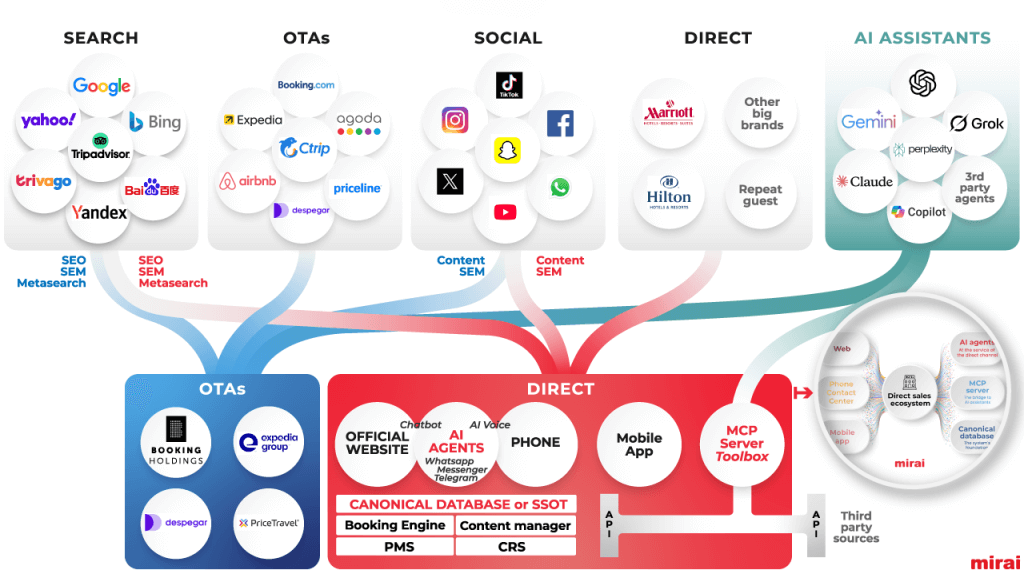
It’s hard to overestimate the importance of having a robust hotel digital marketing strategy if you’re looking to expand your business.
NB: This is an article from Oaky
Digital marketing can help you go global and reach guests from all over the world. But which marketing strategies and tactics are worth implementing in the first place to win the hearts and minds of travellers? We work closely with top-notch hotels and have a solid understanding of how they harness online marketing to create a stable influx of bookings (and capitalise on spikes in demand, too!).
Subscribe to our weekly newsletter and stay up to date
Why is digital marketing important for hotels?
Embracing digital marketing in the modern world is a proven way of getting more customers on board. Hardly you can find any brand that doesn’t take advantage of digital marketing.
When you look at the number of people using the Internet every day, investing in marketing at your hotel becomes a no-brainer. According to Statista, there are 4.6 billion active Internet users worldwide, which is 59.5% of the global population, and this number keeps growing.
As marketing has always been about reaching the right audience at the right time in the right place, the digital space is the perfect place to get your hotel in front of different types of audiences.
1. Strengthen your direct booking website visibility with SEO
Having a direct booking website doesn’t guarantee that it will become the main source of bookings for you. It’s hard to compete with the major OTAs such as Booking.com, Expedia and the like.
To make your hotel’s website visible in the search results, there is some groundwork to be done.
This is where SEO (search engine optimisation) comes into play.
- Don’t forget the three pillars of SEO
Optimising your website for Google won’t be a brisk walk, as it’s a time-consuming process. But given how competitive the hotel industry is, it’s better to start working on it sooner than later. What’s more, OTAs’ fees are unlikely to go down any time soon, so pumping up your SEO should be high on your agenda.
A. On-page SEO
On-page SEO can also be referred to as content marketing. Your hotel’s website will benefit from having a blog filled with engaging content. Make sure to cover the topics that your target audience might be searching for. For instance, these can be blog posts about to-dos in the area your hotel is located, the most attractive sights to check out, or Instagrammable spots to visit.
Before you write on any of these topics, run keyword research. You need to make sure that the topics you have in mind have search volume on Google. Tools such as Ahrefs, Semrush or Google Keyword Planner can help you in this regard.
Sprinkle your website content with hotel news and updates so potential guests can find out about the latest developments and enhancements.
B. Off-page SEO (Linkbuilding and referring domains)
Off-page SEO refers to building your website’s domain authority and improving its reputation and trustworthiness. It includes multiple tactics such as link building, PR, Influencer marketing, events, reviews, etc.
Off-page SEO works hand in hand with on-page SEO. The more times external resources link back to your website or blog, the higher the chance your website authority will improve. This will lead to higher rankings and more website traffic (and, of course, bookings!).
Make it a priority to get mentioned on trendsetting travel blogs. Blog articles featuring “the best places to stay”, “the top hotels in 2022”, and the like draw tons of traffic and travellers who need reassurance from reputable publications before they press the “Book now” button. However, building connections with popular resources might take lots of time and effort, so you might want to consider partnering with a digital marketing agency to help you reach the right contacts and earn mentions in renowned travel resources.
C. Technical SEO
Google also looks at how well your website is structured. The better your website’s structure and interlinking are, the faster Google can crawl it. So optimising a technical aspect of your website can go a long way in achieving better results.
- Optimise your website for mobile
However, optimising your website for the web is not enough to get an edge in the search results.
According to the latest data from GSMA Intelligence, there are 5.31 billion unique mobile phone users in the world today. This is why you have to trim your website’s loading times to perform well on mobile.
Mobile optimisation is also one of the key ranking factors on Google. This is why you shouldn’t skip this step on your quest for higher visibility.
Having your website optimised for mobile devices will also contribute to a smoother booking process, resulting in more delighted users and more reservations.




